In August 2020, the Stonehaven incident both exposed the vulnerabilities of the UK’s rail network to extreme weather events, and demonstrated the link between weather and network safety. In response, Network Rail recognised the need for comprehensive change, particularly to address the key issues of earthworks management and effective water management.
As the backbone of the UK’s rail infrastructure, with over 20,000 miles of track, 30,000 major structures and thousands of signalling, electrification and station assets to maintain, the risk posed across the network by extreme weather is significant and focus is needed to ensure the long-term viability of the network.
Network Rail Chief Executive, Andrew Haines, emphasised the importance of tackling these challenges head on:
“With more and more extreme weather and tens of thousands of earthwork assets across Great Britain, our challenge is massive. And while we are making record investment in these areas, we have asked world-renowned experts, Dame Julia Slingo and Lord Mair, to help us address these issues as effectively as possible, and at pace.”
Launching taskforces for a new approach
Network Rail launched two independent task forces, to help the organisation better manage its earthworks assets, and improve its understanding and response to severe weather events.
Professor Lord Robert Mair, a world authority on geotechnical engineering, spearheaded the review of earthworks management, with emphasis on the vital role of drainage systems, while Dame Julia Slingo FRS, former Chief Scientist at the Met Office, led a weather action task force. Their teams aimed to equip Network Rail with the expertise and competence to manage their infrastructure effectively in the future, particularly considering the impact of climate change.
Arup have worked closely with Network Rail on a number of related initiatives which are driving significant transformation in drainage and lineside asset management as well as promoting network resilience.
WRCCA: a new approach for system-wide resilience
The Mair report highlighted the need for a system-wide approach to improve resilience. The application of systems thinking is not new to Network Rail however there is now an increased focus on understanding the vulnerability of the network to extreme weather. To support this, we were commissioned on the Weather Resilience and Climate Change Adaptation (WRCCA) project, to further explore how a systems view of the infrastructure can be used to better understand the vulnerability of the network.
Working alongside Network Rail’s environmental, sustainability and resilience specialists, we developed a prototype framework for identifying key areas where the network was vulnerable to extreme weather.
Through our work on this project, combining engineering, climate services and digital expertise, we are providing the foundation for a new, comprehensive approach which better protects the UK’s critical rail infrastructure against weather and climate-related risks.
The impact of the Drainage & Lineside Advancement Programme (DLAP)
The Drainage & Lineside Advancement Programme (DLAP) encompassed a series of workpackages which sought to address recommendations from the Mair report. The programme sought to transform multiple aspects of Network Rail’s drainage and lineside asset management system with the aim of enhancing the resilience and sustainability of the network. Arup were commissioned as lead consultant on the programme and mobilised an integrated team of asset management, digital, advisory and engineering professionals to support Network Rail in driving this change.
At a strategic level, we developed a national-level water management strategy, a drainage asset strategy and asset policies for both drainage and lineside. Following the ‘line of sight’ principle of asset management, we developed tools for investment planning. These tools effectively translate strategic objectives and policy statements into practical business planning, and made factors like resilience and sustainability a more integral part of the business process.

For the workforce, we enhanced professional development through supporting Network Rail in developing a new drainage and lineside competency standard, which we then embedded nationally. This was translated into a curriculum structure and map which will be used to enhance staff skills across a diverse range of competencies, including the effective management of climate change risk.

In order to facilitate communication, engagement and change management across the organisation, we harnessed best-practice business psychology principles. We placed a strong focus on stakeholder participation to embed new approaches, support learning and help the Network Rail team fully understand its capabilities.
Innovative solutions: promoting environmental and social value in our work
During the course of this project, we strove to make decisions and take actions that benefitted both the environment and society. We championed new approaches and concepts such as blue-green infrastructure, nature-based solutions and catchment communities. The benefits of these initiatives extend beyond just Network Rail, having a positive impact on broader communities and regions.
The Water Management Strategy (a key deliverable of the DLAP programme), a first of its kind in the UK transport sector, also has far-reaching impact. Built around the central principles of “systems thinking” and “unlocking wider benefits”, it will help Network Rail’s team develop a greater understanding of the impact of water management systems on earthworks – crucial knowledge for building resilience against weather-related disruption. It’s also paving the way for new industry forums that address water management issues with third parties and extend across infrastructure boundaries.

Key project achievements:
- Development and implementation of the first comprehensive water management strategy in the public transport sector.
- Creation of an Adaptive Planning Tool to create, analyse and modify a work bank with clear costs and benefits, aligned to safety, performance and carbon.
- New competency standard for all those managing drainage and lineside assets.
- Creation of a strategic workforce plan and resource calculator tool for transparent decision-making, sustained investment and effective collaboration.
- Improved investment decision-making processes that incorporate sustainability and resilience.
Key outcomes for Network Rail:
- Coordinating business-wide activities with a focus on water management to improve business resilience.
- Implementing resilient asset management strategies to withstand shocks and stresses.
- Holding clear conversations with funding bodies and regulators, improving understanding and mitigation of business risk.
- Prioritising investments across the asset portfolios for best value, boosting cost-effectiveness and resource allocation.
- Advancing knowledge of operationalising engineering risks to gain support from policymakers for sustainable infrastructure maintenance.
- Establishing a curriculum structure and competencies that enhance resilience, fostering a robust, future-ready organisation.
Creating a blueprint for future rail resilience and sustainability
Through our work on both WRCCA and DLAP, we have applied a consistent approach based on a system-wide perspective and collaborative delivery. In doing so, we have supported Network Rail in delivering an effective new framework for resilience within their business. This blueprint helps pave the way for the future of the rail industry – which not only improves the safety and efficiency of the network, but also ensures sustainability and longevity.
Like all complex projects of this kind, we faced challenges along the way. But we learned valuable lessons that will inform future work - such as the importance of a community-led approach to delivering complex change and ensuring the right blend of traditional versus ‘agile’ delivery aligned to the needs of the client and end users.
The innovations developed during this project will serve as a valuable reference for the rail industry and other infrastructure sectors as they adapt and evolve in the face of climate change challenges.
Discover more about how Arup can help your rail project by contacting us at rail@arup.com

















